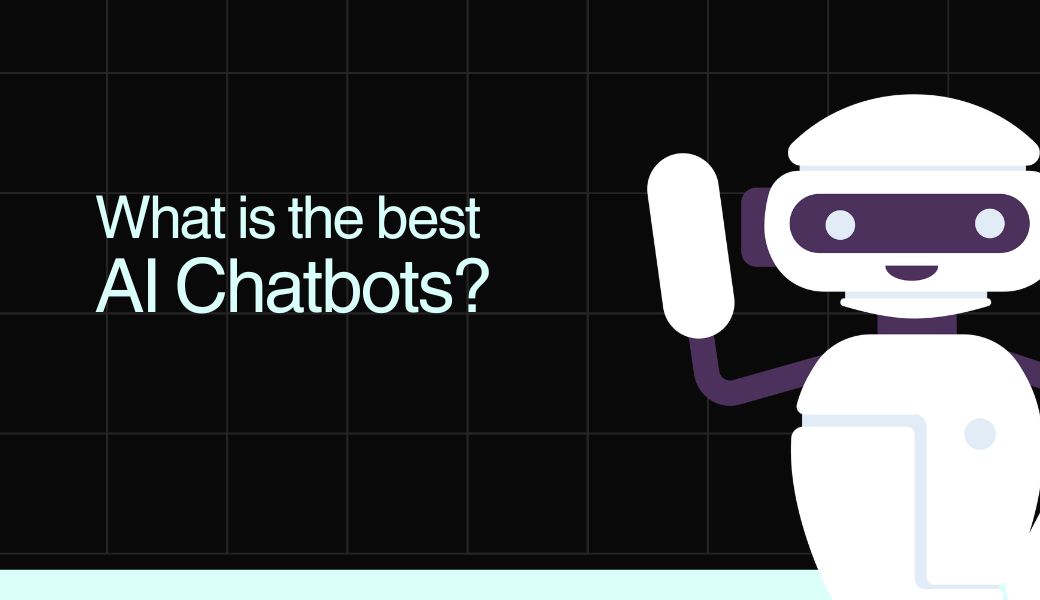Nowaday, AI Chatbots are developing like storms, and deciding on what is the best AI chatbot can be a tricky task. With new models coming out every day, no matter your business type, there’s likely a chatbot out there that can help you achieve all business missions and obtain success.
Don’t worry—we’ll go through the best AI chatbots for 2024, complete with the pros and cons and tips for choosing the right tool. Ready to jump in?
Contents
What is the best AI chatbot?
Before finding out what is the best AI Chatbot, you need to care about what is it. AI chatbot, or artificial intelligence chatbot, is a computer program that is based on Natural Language Processing (NLP) capabilities to understand human language and automate responses to users through text or voice. To be more specific, when you enter a prompt and ask for AI chatbot answers, it leverages AI technology to perceive your input, process information, and generate coherent, complex responses to help you obtain the information you are looking for.
What is the Best AI Chatbot for Shopify?
ChatGPT

It’s been a while since the day Chat GPT was published and made the world crazy about it because of the amazing things it brings to people. Developed by OpenAI, ChatGPT provides a conversational model that can generate human-like images, code, files, and text based on prompts. No matter what purpose, Chat GPT should be the first choice for your work and entertainment. It’s great for writers, coders, planners, and analysts. For Shopify businesses, ChatGPT can be used to create useful content on your website, support customers in emergency, and other purposes.
Pricing: It is the best AI chatbot free for all users when creating an account with the GPT 3.5 Turbo version. Users can pay $20 per month to unlock the ChatGPT 4 model for advanced features.
Pros:
- Allow to access to web, mobile and API.
- User-friendly interfere, easy to use for non-technical users.
- Ability to understand human language and generate human-like response.
- It can also be used to create content, ideas, reports or paintings.
Cons:
- It relies heavily on data to create responses. So, sometimes, the responses are not 100% accurate and reliable.
- Even though it can create content, it is impossible to fully replace human writers. ChatGPT can be an effective help but you still inspect carefully to make sure that the outcome meets the desired standards.
- For non-Latin and non-English languages, translating may not be effective.
>> Read more: Shopify Minimum Order Quantity: What It Is & How To Set Up
Shopify Sidekick

What is the best AI Chatbot? Shopify Sidekick is an AI assistant powered by Shopify Magic, that aims to help you streamline the process of operating and managing your online Shopify store, making it effortless and hassle-free. With Sidekick, you can unlock a range of capabilities such as updating inventory levels, adjusting SKU prices, generating content ideas for your blog and analyzing reports, etc. Undoubtedly, Shopify Sidekick is a powerful tool that leverages AI technology to simplify e-commerce management, providing merchants with the support and insights needed to thrive in the competitive online marketplace.
Pricing: It is one of the best AI chatbot free for all Shopify merchants.
Pros:
- It is a default Shopify AI Chatbot, friendly with Shopify store owners.
- Allow users to customize Sidekick to create workflows that fit your unique business needs.
- Generates detailed reports and insights on store performance, customer behavior, and market trends, enabling business owners to make data-driven decisions.
Cons:
- It may be high for small businesses.
- Customizing workflow may require time and effort.
- Potential risks of data breaches or misuse of information by third parties.
✨✨✨ TRY NOW: Shopify Sidekick
ChatBot

What is the best AI Chatbot? ChatBot.com is one of the top of mind answers when it comes to the question What is the best AI chatbot for small to medium businesses. With its user-friendly flow builder, you are allowed to gather customer data, use built-in AI features, conditions in the chatbot flows and effortlessly improve the response of your chatbot with Training. Also, the Chatbot can learn from purchaser records, which enhances personalized conversations. Chatbot integrates with Shopify, making it really easy to set up and become an AI chatbot for customer service.
Pricing:
- Starter for small company: $52/month
- Team for growing company: $142/month
- Business for big company: $424/month
- Enterprise for large scale businesses: Fixed-price contract with annual billing.
Pros:
- Easy-to-use Flow Builder.
- Shopify integration, LiveChat integration.
- A/B testing for optimization.
- Send Proactive messages.
- Personalized and records-driven conversations.
- Free 14-day trial.
Cons:
- More complicated setup in comparison to other options.
- No mobile apps and no free forever plan.
- No marketing possibilities on Facebook.
>> You may concern: How to Add Social Media to Shopify: 2 Easy Ways to Follow
HubSpot

By leveraging HubSpot’s CRM, companies can customize interactions based on demographics and behavior. The chatbot can send personalized messages, collect information, qualify leads, correspond with clients when live support is offline, book meetings, create support tickets, and trigger email sequences.
Building a chatbot with HubSpot doesn’t require coding, and the visual builder simplifies the process. While Shopify integration requires extra steps, HubSpot’s chatbot gives tremendous scalability and automation features.
Pricing: Free Tier includes basic functionalities like creating ad copy, landing pages, and various forms of content assistance. Paid plans begin from $50 per month.
Pros:
- Integration with HubSpot CRM for centered messaging.
- Easy-to-apprehend visible conversation builder.
Cons:
- More complicated setup procedure in comparison to different alternatives.
- Limited features at the free plan.
- Limited chatbot widget customization options.
Zendesk

This is an AI chatbot example of “what is the best AI Chatbot?” question, how you can use a conversational AI chatbot for automated responses to customer queries when agents are offline in Zendesk. It brands itself as an AI chatbot for customer service by making a conversation flow builder, allowing businesses to create completely tailored responses that link customers to the specific web pages needed.
The chatbot can understand user intent, language and sentiment to provide AI recommendations for live agents. Zendesk helps you gather customer data and arranges requests by priority to get them routed correctly. Although Zendesk is designed to help you with conversations and timely insights, it can benefit your overall customer support operations as well.
Pricing:
- Suite Team: $55/month
- Suite Growth: $89/month
- Suite Professional: $115/month
- Suite Enterprise: $219/month
Pros:
- Support multiple languages.
- Easy setup.
- Can handle all basic customer requirements.
- Visual bot builder for coding averse.
- Assist live chat.
Cons:
- Limited customization options.
- Steep learning curve for advanced features.
Benefits of using AI chatbot for Shopify
If you are a Shopify store owner, chatbots can play an important role as virtual assistants to interact with your customers. However, some of you may not know how powerful an AI chatbot can significantly enhance your Shopify store value while simultaneously boosting engagement, conversions and sales. Here are some key advantages when utilizing best chatbot for Shopify to operate your online store.
Enhanced customer service and experience
The biggest benefit that businesses love about AI chatbots is that they can operate round-the-clock to assist customers in addressing issues when your live agents are offline. Besides, by leveraging customer data such as browsing history, past purchases, or preferences, they can provide relevant product recommendations, answer specific questions, and even address customers by name, making their shopping experience feel more tailored and unique.
Increased conversions and sales
As AI Chatbots can access historical customer data, it helps with sales lead generation and improve conversion rates by offering promo codes and guiding customers toward the perfect purchase. For instance, a chatbot can ask lead qualification questions and even connect the customer directly with a trained sales agent.
Reduced operational costs and enhanced efficiency
65% of store owners implementing AI admit that they have seen a significant increase in productivity. That said, AI chatbots, on behalf of human effort, can automate many repetitive tasks, deal with multiple conversations simultaneously while browsing your product information, check order status, and many more. As a result, you can save a lot of time for these simple tasks, free up resources for other business initiatives, bring about significant cost savings in your enterprise, and thus, improve overall profitability
Expanded market reach and accessibility
AI chatbots can significantly expand market reach and accessibility for Shopify stores by offering multilingual support that makes products and services accessible to a global audience and operates 24/7 which supports customers immediately whenever they need no matter what time zones. Additionally, the AI chatbot is not limited to its functionality to a certain platform, but multiple popular platforms from websites, and social media to messaging apps. That ensures consistent and wide-reaching customer engagement from different connection gates.
What’s more? Chatbots can also generate useful insights about customers through analyzing data and customer behaviors. Thanks to that, you are able to grasp new market opportunities and trends, geo-targeting offers localized promotions, making the shopping experience more relevant and appealing.
Tips for choosing an AI chatbot Shopify
1. Identify your needs and goals
Specify desired outcome from AI chatbot for your search to begin. Do you want to increase customer service, generate leads or speed up internal processing? Having specific objectives can be a guiding force that will make you narrow down your choices and stick with what chatbot software solution to solve for.
2. Learn whether it is ready to go out of the box
Allowing for custom coding, training and configuration in some chatbots but a lack of any code required implementation with others.
It would help if you had a plug-and-play solution, so take those chatbots which come pre-trained on industry-specific data and have capabilities to use machine-learning for learning from its initial responses (which in some cases can also mean relearning) that provides no-code solutions thereby easing integration & maintenance efforts.
3. Time, costs and resources to be considered
AI Chatbot solutions are expensive to purchase, set up and maintain over time — total cost of ownership (TCO) as it is called. Balance] – What time and investment might you have, alongside potential returns and the value it could produce
4. Understand data privacy and ownership issues
One of the main fears while working with AI chatbots is regarding data privacy, security and ownership since conversational-AI-systems collect copious amounts of user-data.
However, if you opt for any third-party AI chatbot service provider then carefully read their policies to ensure they have implemented a strong security (data privacy) mechanism and are fully transparent in ownership of the data.
You may also need to update your own data collection and privacy policies if you use customer-facing bots.
5. Check integrations
Through integrations, the chatbot can automatically talk to other business systems and pass on information about your customers so that they always receive a consistent experience when calling in; you have streamlined workflows optimized for maximum efficiency – however not every bot is able to integrate with all products & devices. Ensure that the AI chatbot can be integrated with your systems.
6. Make sure it fits your channels
Shoppers are everywhere, websites to mobile apps to messaging services and across devices. For example, Omnichannel chatbots remember your customers no matter where they interact with you and help create the same experience for them.
AI chatbots, as an emerging technology, have several limitations and need to be considered in parallel with the ethical issues surrounding them. Whether you’re using chatbots to brainstorm marketing ideas or write blog posts, keep an eye out for factual inaccuracies, biases in data, and plagiarism and copyright infringement. Human oversight is essential to ensure that the content you create is accurate, original, and of high quality.
The bottom line
So, What is the best AI Chatbot? The answer to this question is large depends on your purpose when using the chatbot. Most of the best AI Chatbots are great for creating content, writing code, and improving customer service. Still, each one has its own strengths and weaknesses, take a day and give them all a spin to decide which one will be the best for you and for your Shopify store.
We hope that this step-by-step guide will help you make the right decision. Enjoy!




